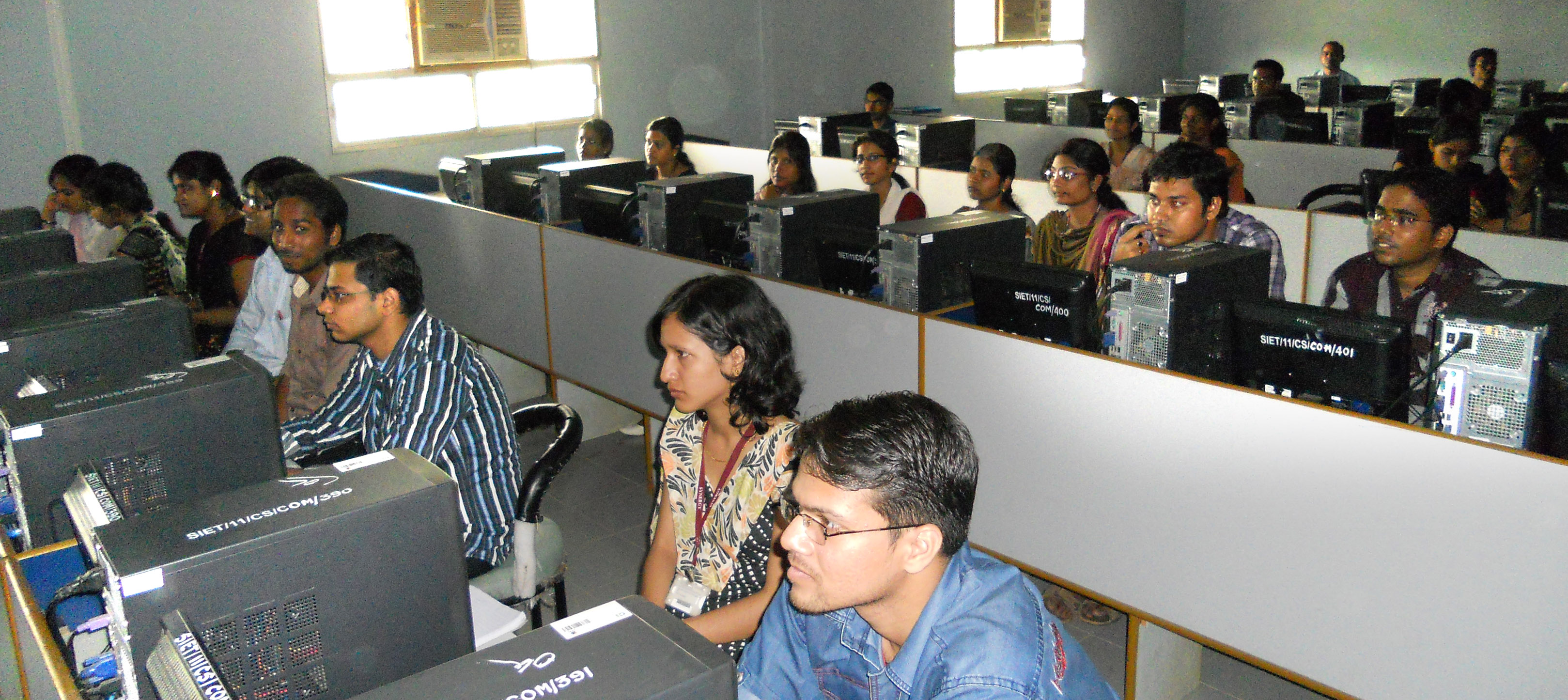
Computer Science & Engineering
Links:
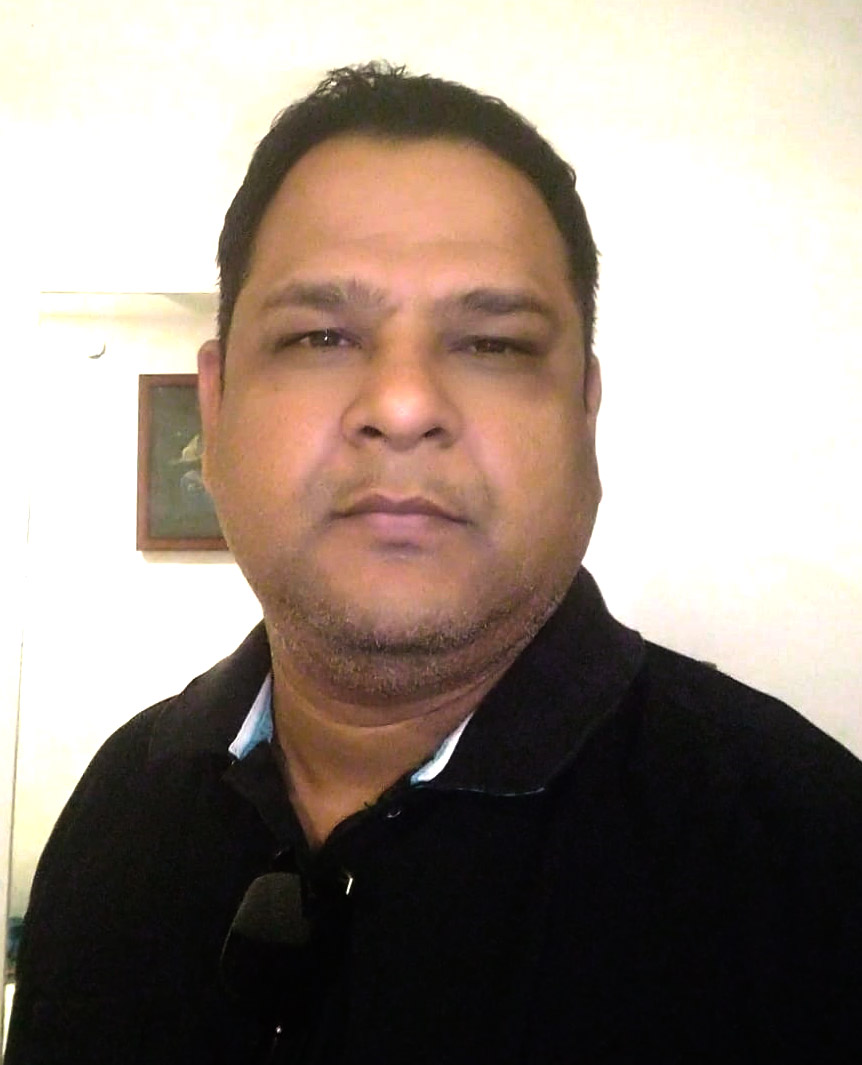
Dr. Subhashree Abinash
(HOD CSE)
COMPUTER SCIENCE & ENGINEERING
The Vision :
To build healthy academic ambiences align with frontline research and quality teaching to cater for the cutting age technologies of the 21st century.
The Mission :
- M1: To provide quality education in both theory and practice and train students to effectively apply this knowledge to amplify their potential for lifelong high-quality careers.
- M2: To conduct research and subsequent innovations to solve real-world problems.
- M3: To promote leadership, teamwork and ethical values among the students to help in their character building.
Program Educational Objectives (PEOs)
PEO1: Students will excel in technical profession that meets the needs of national and multinational companies.PEO2: Students will develop the ability to synthesize data and technical concepts for application to Software Product design.
PEO3: Students will demonstrate the leadership quality as part of teams on multidisciplinary projects.
PEO4: Students will succeed in life-long learning by exhibiting professional ethics.
Program Outcomes (POs):
| PO1 | Engineering Knowledge: Apply the knowledge of mathematics, science, engineering fundamentals, and Mechanical Engineering specialization to the solution of complex Mechanical Engineering problems. |
| PO2 | Problem Analysis: Identify, formulate, review research literature, and analyse complex Mechanical Engineering problems reaching substantiated conclusions using first principles of mathematics, natural sciences, and engineering sciences. |
| PO3 | Design/development of solutions: Design solutions for complex Mechanical Engineering problems and design system components or processes that meet the specified needs with appropriate consideration for the public health and safety, and the cultural, societal, and environmental considerations. |
| PO4 | Conduct investigations of complex problems: Use research-based knowledge and research methods including design of Mechanical Engineering experiments, analysis and interpretation of data, and synthesis of the information to provide valid conclusions. |
| PO5 | Modern tool usage: Create, select, and apply appropriate techniques, resources, and modern engineering and IT tools including prediction and modelling to complex Mechanical Engineering activities with an understanding of the limitations. |
| PO6 | The engineer and society: Apply reasoning informed by the contextual knowledge to assess societal, health, safety, legal and cultural issues and the consequent responsibilities relevant to the professional Mechanical Engineering practice. |
| PO7 | Environment and sustainability: Understand the impact of the professional Mechanical Engineering solutions in societal and environmental context, and demonstrate the knowledge of, and need for sustainable development. |
| PO8 | Ethics: Apply ethical principles and commit to professional ethics and responsibilities and norms of the Mechanical Engineering practice. |
| PO9 | Individual and team network: Function effectively as an individual, and as a member or leader in diverse teams, and in Mechanical Engineering settings. |
| PO10 | Communication: Communicate effectively on complex Mechanical Engineering activities with the engineering community and with society at large, being able to comprehend and write effective reports and design documentation, make effective presentations, and give and receive clear instructions. |
| PO11 | Project management and finance: Demonstrate knowledge and understanding of the Mechanical Engineering and management principles and apply these to one's own work, as a member and leader in a team, to manage projects and in multidisciplinary environments. |
| PO12 | Life-Long learning: Recognize the need for, and have the preparation and able to engage in independent and life-long learning in the broadest context of technological change in Mechanical Engineering. |
Program Specific Outcomes
PSO1: Demonstrate basic knowledge of computer applications and apply standard practices in software project development.PSO2:Understand, analyze and develop computer programs for efficient design of computer-based systems of varying complexity.
PSO3:Develop system solutions involving both hardware and software modules.
The department has 6 (Six) state-of-the-art laboratories such as :
- BASIC COMPUTING LAB
- GRAPHICS & MULTIMEDIA LAB
- DATABASE LAB
- SYSTEM PROGRAMMING LAB
- ON-LINE APPLICATION LAB
- PROJECT LAB
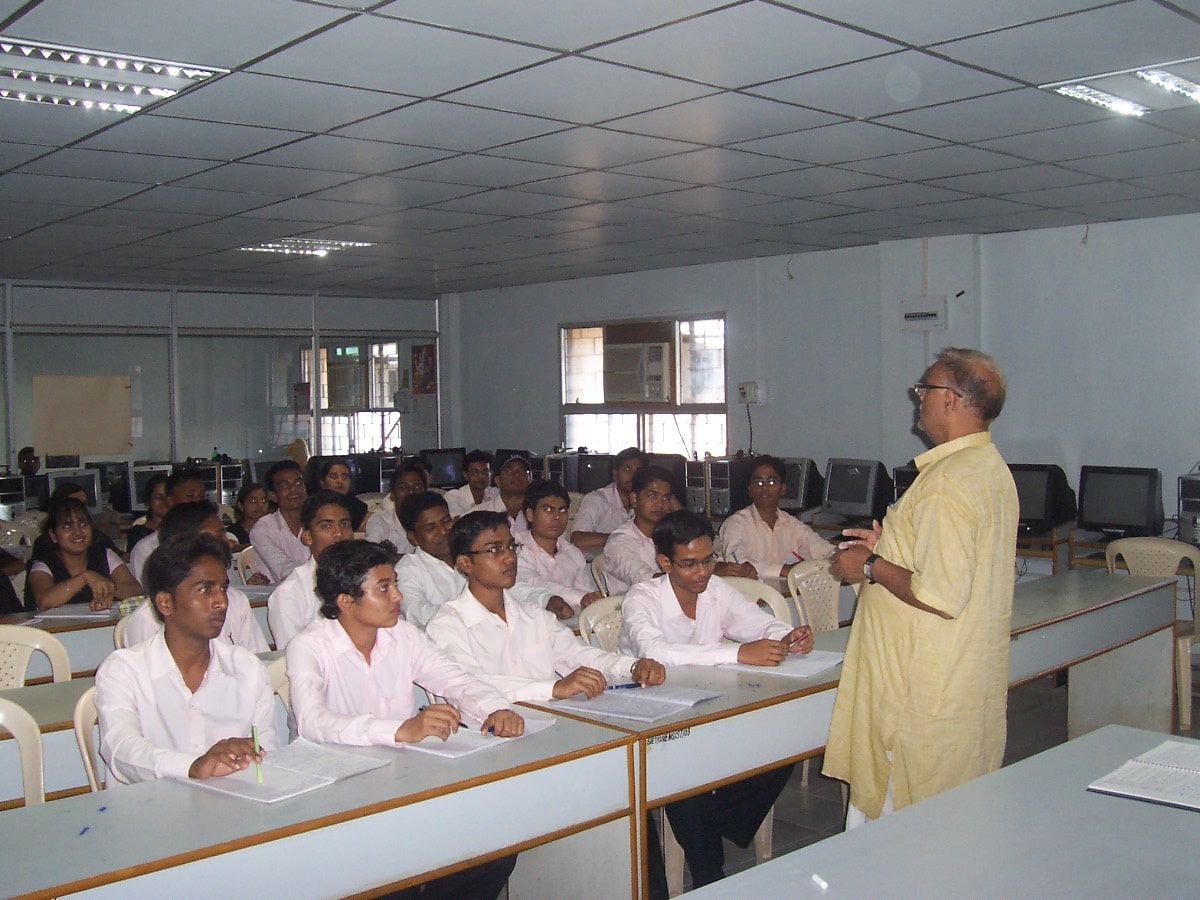
The curriculum in Computer Science & Engineering lays greater emphasis on design and development in addition to application software packages and coding.
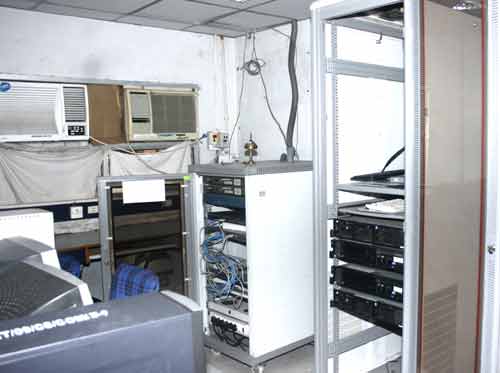 The department has signed several MOUs, notably with Oracle, Infosys Spring Board, Texas Instumentation, TCS, Redhat, Appstone Pvt. Ltd., Lagozon Technologies Pvt. Ltd., Cyber Dojo Pvt. Ltd. for student and faculty training. The institute has implemented Infosys campus connect program, Oracle Work Force development program and EMC data storage system program.
The department has signed several MOUs, notably with Oracle, Infosys Spring Board, Texas Instumentation, TCS, Redhat, Appstone Pvt. Ltd., Lagozon Technologies Pvt. Ltd., Cyber Dojo Pvt. Ltd. for student and faculty training. The institute has implemented Infosys campus connect program, Oracle Work Force development program and EMC data storage system program.
The department has more than 250 desktops of latest configuration and 5 high-end servers to cater to computational needs of the faculty and students. It has Systems softwares like Window server-2003, Novel Netware 5.1, Microsoft MSDN Academic Alliance, licensed application softwares like Fortran, Pascal, Cobol, Borland Turbo C, MS Office 2003, Visual Studio Net 2003, Oracle 10g, Dreamweaver-8. The department has established Internet connectivity with a dedicated line of 300 mbps covering the entire campus including hostels through wireless LAN.
SERVER ROOM :
1. IBM X 3650 server 02 numbers.
2. IBM X 345 server 02 numbers.
3. HCL Net manager 1415 server 01 number.
4. Compaq Pro LIAN 330 Server 01 number.
NETWORK BACKBONE:
- Router – D link DI 2641 01 number.
- Firewall - D link UTM-DFL 1660 01 number.
- Switches- D link (layer 3) 03 numbers.
- Switches- D link (layer 2) 26 numbers.
- Access points D link (3200AP) 38 numbers.
LABORATORIES:
- Laboratories : | Model | No. of Systems | Courses Conducted
- Graphics & multimedia : Core i5 30 C, DSTC, RDBMS, Computer graphics, IWT
- System programming lab Core i5 30 C, DSTC, RDBMS,Operating system, C++
- Database lab Core i3 30 RDBMS, DSTC,C++
- Basic computing lab Core i5 30 C, DSTC, RDBMS,C++
- Project lab Core i7 60 Project
- On line application lab Core i3 30 Software Engineering, COA
CENTRAL SERVICE FACILITATION:
- Wi-Fi Campus (24*7) Design, implementation & Maintenance
- Maintenance of 300MBps dedicated leased line internet connectivity.
- Maintenance of Digital Library.
- All Department and Student Computing Requirements are met by our Faculty and Staff members.
(DAB)Department Advisory Board (2020-21)
| 1. | Dr. Prashanta Kumar Nayak | Director |
| 2. |
Senior Faculty Members of the Department b. Dr. Dillip Kumar Mahapatra |
|
| 3. | a. Mrs. Sangeeta Mohapatra (HOD, ME) b. Mr. S.S. Pati (HOD, EE) |
|
| 4. |
Representatives from Industry Dr. Vipul Vashist, |
CEO, Cyberdojo pvt. Ltd, Ahemadabad CEO, Lagozen EduTech, New Delhi |
| 5. | Representatives from Academics a. Dr. Sarojananda Mishra, b. Dr. Sabyasachi Pattanaik, |
Prof(CSE), I.G.I.T. , Saranga Prof(CSE), F.M. University, Balesore |
| 6. | Parent Representatives a. Mr. Subodh Kumar Panda b. Mr. Sudhanshu Mishra |
Parents |
| 7. | Alumni Representatives a. Mr. Abinash Sahu b. Ms. K. Ashwin |
Allumni |
| 8. | Student Representatives a. Ashutosh Mishra b. Rekha Baitharu c. Saswat Sachin Mishra d. Ankita Maharana e. Animesh Behera f. Smrutilipsha Panda |
Students |
PAC(Program Accessment Committee) members of 2023-24:
| 1. | Dr. Rabindra Narayan Behera | Professor, CSE |
| 2. | Dr. Laxman Sahu |
Professor, CSE |
| 3. | Dr. Dillip Kumar Mahapatra | Asso Proffesor, CSE |
| 4. | Dr. Subhashree Abinash | Assistant Professor, CSE |
| 5. | Mr. Smruti Ranjan Dash | Assistant Professor, CSE |
Teaching learning Methodology
The term “Innovation” in teaching and learning is intrinsically quite broad in perspective and there are a number of views on how to define it. In the department of Computer Science and Engineering, we define it as follows: “Any teaching strategy, approach, technique, or tool can qualify to be termed as an innovation if it is used to produce quantifiable gain for student outcomes or the student experience, and can be implemented widely” Many of such innovative initiatives taken by faculty and staff members of Department of Computer Science and Engineering can be observed in the Course Files, Laboratory Manuals and other documents that are well maintained in the department. Moreover, the availability of ‘DSpace’ in the institute library site has rendered the three most important tasks related with the establishment of innovative practices namely recording, reviewing and critique, highly effective.
Statement of Goals for Innovations in Teaching and Learning
TRealizing the necessity of innovative ideas in the teaching-learning process, and their subsequent implementation through quantifiable initiatives, the following goals have been set: Apart from the standard teaching-learning experience imparted in classrooms, the department will continuously strive to:
- Enrich the learning experience of students through innovative tools and techniques in laboratories.
- Enhance the understanding and knowledge of students with innovative tools and techniques.
- Broaden the perspective of students in matters pertaining to academic, contemporary as well as social issues using innovative tools and techniques.
- Motivate the students to think, formulate and act innovatively themselves.
Innovative Initiatives in Teaching and Learning Process taken by the Department
Innovation is literally done by each dedicated faculty, knowingly or unknowingly; literally every single working day of his/her career. Some initiatives may be so small to escape attention, and might be difficult to quantify and record; but may affect the learning of students in a subtle but important way. On the other hand, some initiatives might be so impactful so as to be clearly visible as making huge strides in improving the teaching-learning process. Given below is a listing of some of the noticeable initiatives taken by the faculty of the department. However, it should not be construed as a conclusive list; but as a part of an open-ended process of continuous improvement.
- DSpace : Faculty of the department regularly upload a lot of academically relevant documents on the DSpace repository of Library portal. The portal is directly accessible from the institutional website. The portal can also ne accessed as : https://www.synergyinstitute.net/digitallibrary/ . The DSpace module can be accessed through the library portal. It contains power point presentations, articles, lecture notes, lab manuals and many other useful documents that are beneficial for the students.
- Club activities: There are two clubs that are currently being run by the Department of Computer Science and Engineering: (i) Robotics club (ii) Videographer club (iii)Web designing club
- Virtual labs: In certain labs, for instance the vibration engineering lab, some relevant experiments are conducted online on web browsers with the help of simulators. Such online facilities are called as virtual labs http://www.vlab.co.in, and are a part of an excellent innovative initiative taken by the MHRD of India.
- MOOCS: MOOCS or Massive open online courses are a relatively new entry in the academic sector throughout the world. Although the role of MOOCs in effective dissemination of knowledge is still under debate, they are speedily gaining unquestioned acceptance in more and more academic circles as an innovative means of imparting additional knowledge to students. Here at SIET, we support augmenting our own efforts of effective delivery by MOOCs available through agencies like NPTEL and SWAYAM.
- Group leaders in lab sessions: This initiative has proved to be highly effective in lab sessions. A group leader is selected for each group working on an experiment in each lab session. The group leader is made responsible for all the outcomes of the lab session of that particular day. Every week in the lab, the group leader is changed so as to pass the responsibility to each student by the end of semester. This inculcates leadership and responsibility in students.
- Power point presentations: Use of this widely accepted technique is done wherever deemed necessary in the department. This has actually become a standard norm in the teaching-learning process, and is facilitated by the fact that all our classrooms are well-equipped with high quality projectors ready for use any time.
- Additional effort for weak students: Students unable to score well in the term exams are identified and are given more attention by faculty. In many cases, they are tasked with additional assignments to enhance their understanding of respective subjects.
- SMS absent report to the parents: The parents of the students are informed about the attendance of their son/daughter in daily basis. The SMS is sent at 4.30 PM everyday to the parents of the students so that the parents are kept in the loop about the attendance. The attendance reporting module of the college ERP takes care of the module .
- WhatsApp group correspondence with students: Faculty frequently engages in WhatsApp Group for correspondence with the students to share notes, remarks, assignments and test results. This significantly boosts the out-of-class learning experience of students.
- Student presentations: In many relevant subjects, students deliver presentations to the rest of their classmates. This significantly boosts students’ confidence and their learning experience.
- Audio-visual learning: In many subjects (wherever necessary) audio-visual aids are used. It is a proved fact that audio-visual presentations in the classrooms are more effective in capturing the attention of students.
- Classroom quiz sessions: These help in creating interest by breaking monotony of regular classes while enhancing the learning experience.
- Adherence to Bloom’s taxonomy: The mid-term tests for all subjects in the department are made in strict adherence to the Bloom’s taxonomy. This ensures that the learning as well as the assessment mechanism is based on standard practices of the academic fraternity worldwide.
- Personal counseling: This has helped many students in dealing with academic as well as personal problems in the department. Every faculty in the department acts as a counselor to any student with any problem he/she is willing to share.
- Library assignments: Students are set such assignments from time to time; wherein they are required to research certain topics from the resources available in the institute library and finally submit a report.
